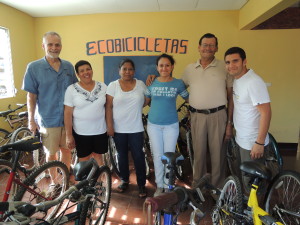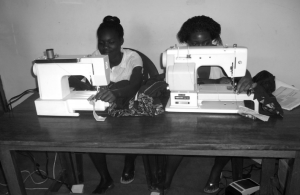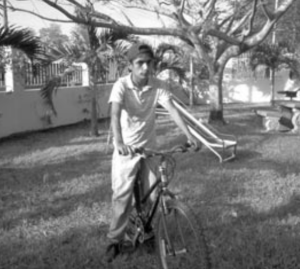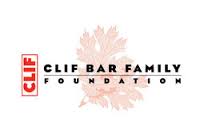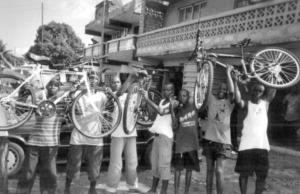|
Category Archives: bicycles
EcoBicicletas: P4P Partner in Nicaragua
EcoBicicletas (“EcoBici”) is our partner in Nicaragua. EcoBicicletas is located in Rivas, Nicaragua, in the southwestern part of the country between the Pacific Ocean and Lake Nicaragua. Rivas, where we’ve shipped since 1992, is the oldest of our active programs, and we have sent more bikes to Nicaragua—more than 42,000—than to any other location. EcoBici is owned and managed by the Santana family, good friends as well as respected professional partners.
EcoBici serves low-income residents in the many small towns of the southern Pacific coast region of Nicaragua, where the terrain is flat and rolling, ideal for cyclists. EcoBici’s “profits” from sales finance small-scale rural community development projects selected and implemented by representative community organizations. These have included the construction of health clinics, schools, community potable-water systems, an infant feeding center, and the planting of community wood lots. EcoBici has also donated P4P-supplied sewing machines and baseball equipment to the José María Moncada School, the Susana López Carazo School, the Nandaime Women’s Center, and the Girasol Women’s sewing co-op on Ometepe Island. Pedals for Progress has placed more than 35% of the adult population of Rivas on wheels, and has created a self-supporting local bicycle import, assembly, and repair business.
- Click here to read more about the early days of EcoBici.
- Click here to read more about Karla Santana, the one-woman operation behind EcoBici. She is second from the left in the photo; her son Carlos, who also works at EcoBici, is on the right.
EIT: P4P Partner in Uganda
[As of Summer 2017, the P4P partner in Uganda is the Mityana Open Troop Foundation. The information below refers to our previous partner, the Entrepreneurship Institute of Technology.]
Based in Kampala, the capital city of Uganda, the Entrepreneurship Institute of Technology (EIT) is a vocational institute which serves men and women who, for many reasons, could not continue their formal schooling. Our mission is to prepare them for a working life and a bright future. We offer courses in, among other things, tailoring, welding, metal fabrication, bicycle repair, and computer literacy.
In our country, private institutions are among the most important providers of vocational training, accounting for almost half of all such education. A population of skilled workers is essential for any country seeking to reduce poverty and develop an economy strong enough to provide the hope for a better future for its citizens. Vocational schools help establish, sustain, and expand the industries necessary to do this.
But in Uganda there are not enough opportunities for youth to attend quality schools. There are widely differing standards of education. Poor administration and insufficient communication between institutions and the government mean many schools have failed to gain official recognition or attention from the people whom they should be helping. And student payments are the primary means of finance for vocational schools—resulting in high fees that the majority of Ugandans cannot afford.
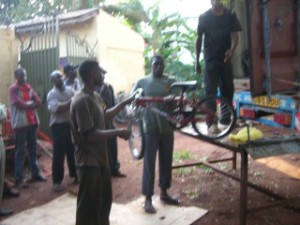
EIT (formerly EIAAT, Entrepreneurship Institute of Applied and Appropriate Technology) was established by directors Charles Mulamata and Joyce Kayongo, a married couple who are also involved in other businesses. Their work in metal fabrication, solar and other renewable energies, and energy-efficient stoves helps them afford to run their institute differently than other Ugandan schools.
Another difference is that EIT receives donated containers of second-hand bicycles and sewing machines from Pedals for Progress. The used bicycles are sold at low cost locally. Most of the income is then used to finance the importation of more P4P containers. The surplus money is used to finance the vocational school’s administrative costs and its other development activities.
The sewing machines EIT receives from P4P are used in our school’s tailoring program. A student starts on a machine and learns how to use and maintain it. Students, if interested in their particular machines, have the option to pay for them in small installments as their studies progress. Then, if at the end of the course the sewing machine is fully paid, students can take them away for their future work. In this way students not only learn tailoring but are encouraged to plan and budget for the future, and motivated to care for their sewing machines. Students are introduced, in a practical way, to entrepreneurship.
In addition to our vocational programs, the distribution of bicycles is very important for us. They are more than a means of funding for our school. The benefits to purchasers of our bikes are enormous. The bikes are sold at low price and are very useful in Uganda, as we have very poor road conditions which are sometimes impossible to navigate by car. Some of these unreachable areas are left undeveloped because the local population do not have easy means of mobility to go where services are provided, and those services cannot come to them. The increasing cost of fossil fuels also contributes to the demand for alternative means of transport. The bicycle offers easy, low cost, all-weather, all-road, on-demand transportation and is clearly one of the most appropriate technologies for a developing country.
Mission Statement
The Entrepreneurship Institute of Technology (EIT) is an adult education program. Its primary purpose is the advancement of job creation and skilled worker education. Its goals are:
- To attempt to enhance the income generating capacity of the graduates through the teaching of specific technical work-related skills
- To provide on going consultation in small business development to the skilled craftsmen trained
- To help create more economic prosperity for the Ugandan society in general and the region at large
- To offer opportunities for all to train themselves for a skilled career
- To offer the pride of self-sufficiency
- To acquaint the students to the various job creation opportunities available
- It shall act to promote school activities and that increase the students’ interest in job growth, education, personal growth and civic affairs.
- It shall be non-denominational with no bias to race, religion, gender or political affiliation.
Click here for a 2011 report on EIT.
A Letter from the Heartland
by Tim Weitzel
Fall 2010 InGear
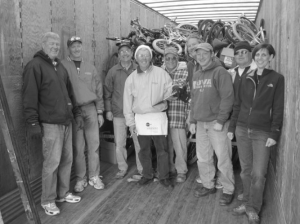
Hello to everyone from the Heartland of America—Dubuque, Iowa to be exact. Dubuque is an old river town of about 62,000 people situated on the banks of the Mississippi River. I suppose many of you would think of Iowa as flat as a pancake, but Dubuque’s topography is more similar to San Francisco than to the Great Plains.
I first talked to Dave Schweidenback four years ago. In 2006, after roughly five years of “thinking about it,” I decided to try in some small way to “help someone.” My daughter, Erica, had returned from Haiti in 2002 with horrific stories of poverty and the immense transportation problems of that island. Being an avid road bicyclist, I had 3 or 4 “extra” bikes in my garage. My plan was to collect a few more and send them to a Catholic missionary in Port au Paix. I now laugh at how naïve I was. By the time I looked up, I had 30 bikes in my garage with no idea what to do next. Over coffee, a good friend of mine said simply, “Why don’t you check the internet? Somebody is probably already doing that.” And of course they were!
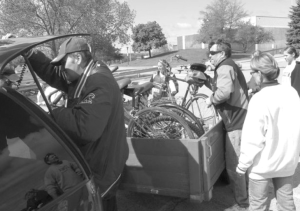
I called a phone number at Pedals for Progress and some guy named Dave answered. We talked for a long time, and though I wasn’t sure he liked me, I needed to get rid of “my bikes.” My next problems were determining how I would get them to New Jersey and how much would I have to pay. I kind of remember Dave saying something about $10.00 a bike, which meant something like $300.00, plus shipping to New Jersey. I soon learned the economics of philanthropy! But, like super heroes, Ding Bell, Jack Blosch, John Markham, Paul Schultz, Tim Hodge, the Dubuque Noon Optimists, the Dubuque Bike Club, and Joe Bitter burst onto the scene. Almost overnight, it seems now, I went from a one-man show to a well oiled, yet still somewhat unorganized, group of dedicated bike collectors.
We still scramble for money, but things always seem to work out. We often talk and dream about how to collect more bikes or how to get them to New Jersey and beyond more efficiently. I see no turning back now. Our immediate goal is to continue to organize and plan for future collections.
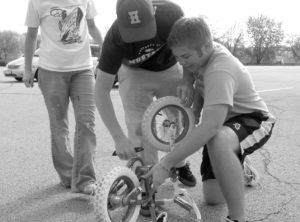
When Dave asked me to write this article about Pedals for Progress presence in Dubuque, I was proud, humbled, and a bit surprised. Proud, because I really believe we have helped lift families out of poverty and made their lives a bit easier. Humbled, because I am just a small part of the Dubuque operation: much, much credit goes to the unsung volunteers, the Dubuque Noon Optimists, Dubuque Bike Club, Jack Blosch, Ding Bell, and my father, George Weitzel. Surprised, because when I started out four years ago I envisioned collecting 50 bikes at the most. We currently have collected 1663 bikes and I am constantly amazed at the community support we receive. Finally, above all, I am thankful to Dave Schweidenback for trusting someone from half a country away whom he has never met, and to all the donors who continue to bring in their bikes.
Programii Alternativave Sociale Stimuluese, Tirana, Albania
Fall 2010 InGear
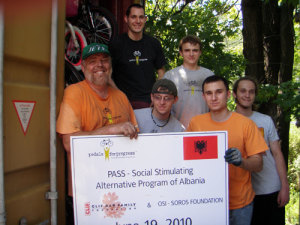 PASS (Programii Alternativave Sociale Stimuluese, Social Stimulating Alternative Programme), located in the Albanian capital city Tirana, was established in 2002 with the goal of encouraging community action and raising public awareness of local social and environmental issues. Some of their activities include operating the Welcoming Center for Families in Need, involving local residents in resolving community problems through their Volunteer Action Movement, supporting the AKSES Program to foster the education and employment of rural youth, and facilitating youth community engagement through the Civil Youth Project.
PASS (Programii Alternativave Sociale Stimuluese, Social Stimulating Alternative Programme), located in the Albanian capital city Tirana, was established in 2002 with the goal of encouraging community action and raising public awareness of local social and environmental issues. Some of their activities include operating the Welcoming Center for Families in Need, involving local residents in resolving community problems through their Volunteer Action Movement, supporting the AKSES Program to foster the education and employment of rural youth, and facilitating youth community engagement through the Civil Youth Project.
Albania is a small country, approximately the size of Maryland, on the Adriatic coast of the Balkan Peninsula. After the Second World War it was isolated from the rest of the world by a xenophobic, Stalinist government. For decades Albanians, mostly Muslim, experienced purges, economic hardship and underdevelopment, political and civil repression, and the total ban on religious observance.
Its long isolation contributed to Albania’s status as one of the poorest nations in Europe. In 2008 its per capita income was less than $4000 a year and the official unemployment rate was over 12%. Remittances from Albanian workers abroad make up almost 10% of the country’s economy; with the recent crises with the global financial system and with the Euro, these remittances have fallen dramatically.
PASS works with the most marginalized populations of Albania, primarily rural dwellers and ethnic minorities. These are the people who suffered most under the Communist regime and the recent decline in remittances, and who were mostly ignored by the liberalization of the past two decades. The rate of unemployment and lack of education among this population is very high.
With help from Pedals for Progress, PASS plans to establish a Tirana Community Bicycle program. Not only will this provide jobs for workers maintaining and managing the community bicycles, but the bikes themselves will help reduce the social and economic isolation of suburban and rural communities by providing dedicated transportation from the margins of Tirana to the center. An additional effect of the program will be to raise awareness among citizens of the bicycle as a fun, healthy, and environmentally sound method of transportation.
P4P Recipient Spotlight: Eliseo Perez, Nicaragua
Spring 2010 InGear
Name: Eliseo Perez
Age: 16 years
Parents: Cristobal Manuel Perez y Catalina Valverde
Born in: Diriamba Carazo, Nicaragua
School: Colegio la Palmera
Completed 3rd grade of elementary school
Family: 4 brothers
Meet Eliseo Perez. When he was very young, he was diagnosed with leukemia and doctors discovered a brain tumor. Not only could he not ride a bicycle, but he could only walk with the aid of a cane. As he got older, and with treatment, his condition improved. At the age of ten, he stopped using the cane and began to play, ride a bicycle, and play soccer. His doctors told him he should not play sports due to his illness, but his poor health could not keep him from being an active teenager. Once he started biking regularly his health improved—the exercise helped his body develop. His bicycle became much more than a means of transport; it gave him his life back. The use of the bicycle gave him the opportunity to develop the potential of employment. He now works as a gardener, so he can contribute financially to the family income. What a difference a bike can make.
Consult-Nord: P4P Partner in Moldova
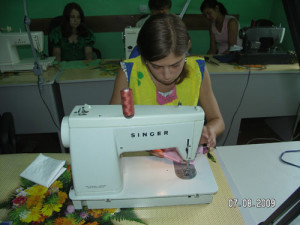 Consult-Nord, a local Moldovan NGO established to promote local economic development in Pelinia, saw the potential results that Pedals for Progress’s bicycles and sewing machines could provide and requested to become a partner. Consult-Nord started selling bicycles this winter after receiving a shipment in late December of 2008. The good quality, affordable bicycles are now available at a shop set up by Consult-Nord, offer numerous opportunities to villagers that otherwise would be inaccessible to them.
Consult-Nord, a local Moldovan NGO established to promote local economic development in Pelinia, saw the potential results that Pedals for Progress’s bicycles and sewing machines could provide and requested to become a partner. Consult-Nord started selling bicycles this winter after receiving a shipment in late December of 2008. The good quality, affordable bicycles are now available at a shop set up by Consult-Nord, offer numerous opportunities to villagers that otherwise would be inaccessible to them.
The photographs are from the sewing workshop at Consult-Nord from the first shipment.
Read more about Consult-Nord and Moldova in the Fall 2009 InGear.
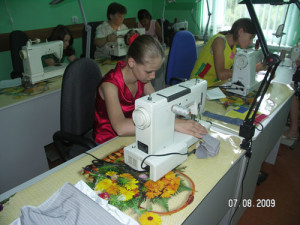 |
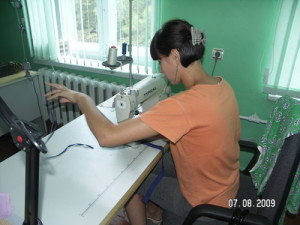 |
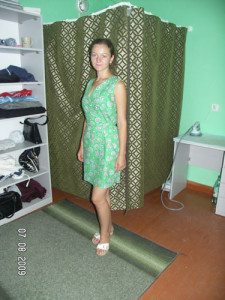 |
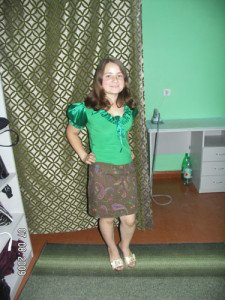 |
Continued Clif Bar Support
Spring 2009 InGear
Our project in Sierra Leone is less than a year old, and it’s already a success despite many initial logistical difficulties. Helping us overcome these challenges is the very generous Clif Bar and Company. Because of a significant grant from the Clif Bar Family Foundation, we were able to fund the vital first shipment of bikes to Sierra Leone in July. This got the project started.
Since then, our partners in Sierra Leone have already received their second shipment (described in Greg Sucharew’s article). As with all of our programs, it’s the first shipment that enables our partners to get their revolving fund started so they can pay for subsequent shipments. In the case of Sierra Leone, shipping charges are much higher than usual, and without help from Clif Bar, we never could have met that expense. But financial assistance from the Clif Bar Family Foundation hasn’t stopped there. They recently informed us they will be providing us with a grant of $10,000 a year for the next three years! This will ensure the growth of our program in Sierra Leone, as well as enable us to open new programs that, like Sierra Leone’s, are normally too costly for us to start. As you might suspect, these programs are in the very countries that most need help.
In addition to fueling athletes and health-conscious people-on-the-go with delicious and nutritious energy bars, gels and drinks, Clif Bar does a lot of other wonderful things for the planet. You can learn more at www.clifbarfamilyfoundation.org, where you’ll also find us listed among their Long-term Partners. While you’re there, don’t hesitate to purchase an “On Your Behalf” Gift Card from their site. You can support your favorite bicycle-recycling nonprofit, or any of the other noble groups among their Long-term Partners.
Our Resident Filmmaker Visits Sierra Leone
by Greg Sucharew
Spring 2009 InGear
My family has been involved with Pedals for Progress in one capacity or another for over a decade now. My father serves as a member of the board. My brother worked for the organization in the 1990s. I began with Pedals in 2002. And I’m sure during this span of time we’ve donated a bike or two. So the idea of bicycles reducing poverty in the underdeveloped world is not new to me. I’ve heard the stories, seen the photographs, read all about the programs, I know how valuable a bike can be to a person in need. And this winter I got the opportunity to see the benefits these bikes produce with my own eyes.
Last year Pedals for Progress began a partnership with a homegrown nongovernmental organization in Kenema, Sierra Leone, called the Center for Research Training and Program Development (CRTPD). They provide their community with a women’s health clinic, a school for the blind, youth centers, and in general try to promote better health and well-being within and around Kenema. The bikes they get from Pedals for Progress help them multiply the aid—sales of the bikes fund their other efforts, and of course, bikes help those who receive them, as well as the shops that are established to service the bikes. The economic stimulation is widespread.
In early January 2009, Pedals for Progress sent me to Sierra Leone to work with our partner there and to get footage for a film I’m making about the project. Needless to say, I was very excited—this was my first trip to Africa.
I traveled from the U.S. with Shed Jah, who is originally from Sierra Leone, and who is chairman of the CRTPD board. We left Newark, New Jersey, for London, and from London flew on to Freetown, Sierra Leone, where we were met by three of Shed’s colleagues from CRTPD, and where I encountered a crowded, dusty, trash-strewn city of mostly unpaved red-dirt streets and poorly-built shacks. A far cry from the stately London I had left only eight hours earlier.
A few days before Shed and I arrived in Freetown, a container of P4P bikes had been cleared by customs, unloaded and temporarily stored away. It remained for our contacts from CRTPD to find a way to get the bikes transported another 250 miles to Kenema, where CRTPD is located. They needed to find a driver, with a truck, willing to navigate the dangerously rough network of roads. It took three days, during which time Shed showed me around Freetown, but they finally negotiated a price and got their driver.
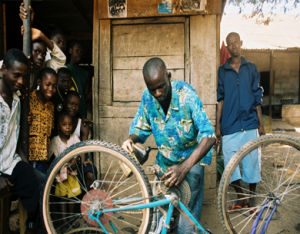
The roads to Kenema from Freetown are nothing like roads in the U.S. Even where there’s pavement, it’s not always much smoother than the rugged reddish-orange dirt roads we mostly traveled on, which during this time of year, dry, windy, hot, meant a thick hazy cloud trailing every vehicle, leaving a fine layer of dust on everything. It took the truck over 12 hours to reach Kenema. I arrived with Shed a few hours earlier in the borrowed United Nations car we traveled in. Along the way, our driver occasionally pulled over in one of the villages lining the torn road, and seeing me, an obvious foreigner in the passenger seat, all the young children would run up to the car trying to sell fruit, soda, or bread. I was surrounded and overwhelmed, but I remember vividly one young girl among them. She was maybe eleven or twelve and kept motioning like she was putting food in her mouth, yet her hand was empty, and you could see in her face, so was her stomach. For the first time in my life I witnessed abject poverty. It was distressing.
When the truck finally arrived in Kenema at the CRTPD facility, a crowd was already waiting. They were there to help unload, and also to get first choice on the bicycles. A staffer kept count and a careful eye on the bikes as they were unloaded, sorted and stacked inside their facility. CRTPD still had to decide on prices, so distribution was delayed. The disappointed would-be customers attached notes, or tied shreds of plastic bags to frames, marking the ones they wanted to purchase.
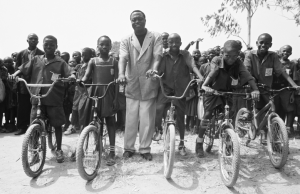
Over the following days, I wanted to see how bikes were used in Kenema, and whether many people had them. So I went in search of bikes and discovered a burgeoning bicycle culture. I saw bicycles for rent, along with several bike shops and bike mechanics in town whose enterprises supported their own families, and provided employment for others as well. I visited the bike retailers who sold their products along the main road in and out of Kenema. I spoke with a number of students who used to spend hours walking to school and who were now able to ride bicycles. One young man told me he used to walk for six hours to get to school and back. Bikes definitely had a significant and growing presence in Kenema.
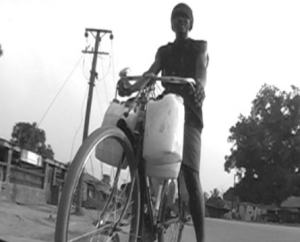
One particular group of men I met, who make their living with the help of their bicycles, were the local palm-wine tappers. A tapper wakes at the crack of dawn and rides for miles, heading outside the main city and deep into the bush, where he scales palm trees all day collecting sap, which is fermented into an alcoholic beverage called poyo. This is dangerous work, and tappers often suffer injuries falling from trees. Once they collect the sap, the large containers they use are roped to their bikes and they begin the long trek back to the city where their clients await. I have seen as many as twelve massive bottles hanging on a bike as its rider slowly pedaled by. This is much less burdensome than carrying them without a bike; plus, a tapper can use his bike to transport a much larger load in the first place.
During my stay, I got to see the other things our partner does, much of which is now helped with revenue from CRTPD’s bicycle program and the bikes P4P sends them. They provide critical support for local groups engaged in sustainable revenue-generating activities. They also help fund women’s and youth groups, and agricultural projects, like the ones I visited in the nearby village of Kpai, where rice swamps and cassava fields were being harvested.
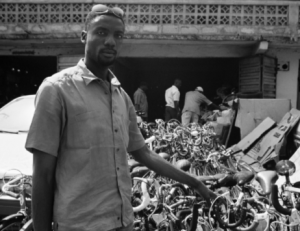
Among their operations is the Vocational Training Center for the Blind, a facility where the visually impaired are housed, taught Braille (using old United Nations reports for lack of proper textbooks) and craft woven products such as baskets and mats. There is also a women’s group that, among other things, teaches orphans and runs a local daycare center. There is a vocational center where trades such as cosmetology, tailoring, electronic repair, and mechanics are taught. And CRTPD is even able to provide scholarships for some students who would otherwise be unable to attend.
The bicycles CRTPD receives play a large role in these programs and ventures. People in Kenema clearly need basic transportation, and the bikes from Pedals for Progress provide exactly that. When CRTPD receives P4P bikes, they are sold at a nominal price so the poorest people in town can afford them. The revenue from these sales offsets the shipping costs of the next shipment, as well as funds CRTPD’s other operations, such as the vocational training center and women’s group—all vital works in Kenema. And once distributed, the bikes then stimulate the local economy.
Pedals for Progress sent me to meet our partner in Sierra Leone and film their operation. For me, seeing all this work with my own eyes, for the three weeks I was there, was truly inspiring. I hope my film captures that.
Clif Bar Grant “Fuels” New Project in Sierra Leone
Summer 2008 InGear
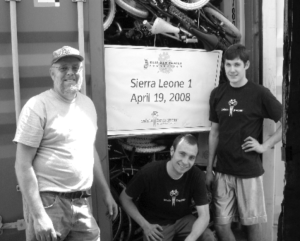
Doing good for Clif Bar begins with their responsibly made, wholesome—and rather tasty—products, and continues with their passion for giving back. Many of us at Pedals for Progress have enjoyed Clif Bars at collections, which require considerable energy, but now Clif Bar Family Foundation has provided Pedals for Progress another form of energy, if you will, in the form of a $7,000 donation to start a new project in Sierra Leone. And earlier this July, our partner in Sierra Leone received their first shipment of bikes.
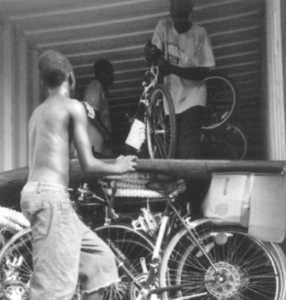
After a decade of civil war, ethnic strife, and severe economic hardships, Sierra Leone has arrived at a stable and promising phase. With a population made up largely of subsistence farmers, in order to secure long-lasting peace and security, it’s important that rather than merely subsist, these farmers thrive. Economic stability goes hand in hand with peacefulness. And bicycles are one means to contribute toward both conditions by developing a much needed transportation infrastructure.
Currently, in Sierra Leone, there are insufficient roadways, there’s little or no public transport, and, as is the case in most developing nations, the poorest citizens must walk everywhere. Using bikes, farmers can transport goods more easily, get back and forth to their fields more often, and of course, meet their other transportation needs. When it comes to moving produce to market, it’s possible for a farmer to move as much as five times what he could normally transport on foot by using his bike as a carrier. In many cases, Pedals for Progress bikes are even modified by their new owners with large baskets, racks, and even insulated boxes to carry perishable items. Such utility is indispensable in the developing world, and is ultimately the means for a family to live a decent and productive life with greater freedom and earning potential.
Now that Clif Bar has so generously helped get our Sierra Leone project going, more bikes will follow. With any new project, the most difficult shipment of bikes is the first one. Clif Bar has helped us and our new partner past that obstacle, and further shipments will certainly follow. With each new shipment, more people—more families!—will begin to live better lives in Sierra Leone thanks to Clif Bar’s generosity.

